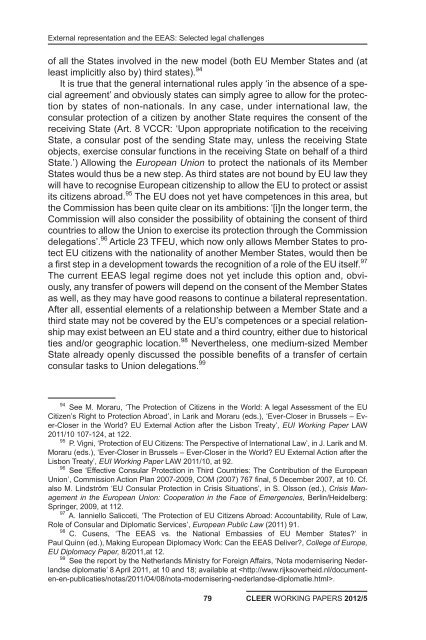CLEER WORKING PAPERS 2012/5Van Vooren <strong>and</strong> Wesselare good reasons to believe that this development may have consequencesfor the diplomatic services <strong>of</strong> the Member States <strong>and</strong> that traditional internationallaw is being sidestepped. 89 In that sense, Article 23 itself already formsa good example <strong>of</strong> a deviation from general international law, as it provides forthe right <strong>of</strong> <strong>EU</strong> citizens to diplomatic <strong>and</strong> consular protection <strong>of</strong> Member Statesother than the State <strong>of</strong> nationality in the territory <strong>of</strong> a third country. 90Indeed, one <strong>of</strong> the key problems is that the relevant international rules departfrom the notion <strong>of</strong> ‘nationality’, defined as ‘the status <strong>of</strong> belonging to a state forcertain purposes <strong>of</strong> international law’ 91 Indeed, ‘the criterion <strong>of</strong> nationality helpsto recognise the entity that is both competent <strong>and</strong> accountable to act in thename <strong>of</strong> individuals vis-à-vis third countries.’ 92 Diplomatic protection is closelyrelated to nationality as, in principle, states can only protect their own nationals.In a classic case in 1937, the Permanent Court <strong>of</strong> International Justice argued:“In taking up the case <strong>of</strong> one <strong>of</strong> its nationals […] a State is in reality exercisingits own right […]. This right is necessarily limited to intervention on behalf <strong>of</strong> itsown nationals because, in the absence <strong>of</strong> a special agreement, it is the bond<strong>of</strong> nationality between the State <strong>and</strong> the individual which alone confers uponthe State the right <strong>of</strong> diplomatic protection”. 93 While, this may be true for diplomaticprotection, it may be easier for states to cooperate in consular matters,which are generally <strong>of</strong> a more administrative nature. In general, however, it isclear that ‒ irrespective <strong>of</strong> the invention <strong>of</strong> a ‘European Citizenship’‒ a ‘bond<strong>of</strong> nationality’ is by definition absent in the relationship between the <strong>EU</strong> <strong>and</strong> itscitizens. European citizenship is granted to the nationals <strong>of</strong> the Member States(Article 20 TF<strong>EU</strong>).In the academic debates on the scope <strong>of</strong> Article 23 TF<strong>EU</strong> the point is <strong>of</strong>tenmade that this provision not only provides a right to <strong>EU</strong> citizens to consularprotection, but also to diplomatic protection. Public international law academicswould argue that it is in particular this dimension that cannot be established bythe <strong>EU</strong> unilaterally, given the non-existence <strong>of</strong> the concept <strong>of</strong> ‘European nationality’.In their view the essential ‘solid link’ between the intervening state<strong>and</strong> the protected citizen is missing. It has, however, been argued that the ILCDraft Articles on Diplomatic Protection establish minimum st<strong>and</strong>ards underpublic international law which permits the States to go beyond these rules aslong as they respect the condition <strong>of</strong> obtaining the express unanimous consentCloser in Brussels – Ever-Closer in the World? <strong>EU</strong> External Action after the Lisbon Treaty’, <strong>EU</strong>IWorking Paper LAW 2011/10 107-124, at 118.89 Vermeer-Künzli, ‘Where the Law Becomes Irrelevant: Consular Assistance <strong>and</strong> the EuropeanUnion’, 60 ICLQ (2011 at. 965-995.90 P. Vigni, ‘The Protection <strong>of</strong> <strong>EU</strong> Citizens: The Perspective <strong>of</strong> International Law’, in J. Larik<strong>and</strong> M. Moraru (eds.), ‘Ever-Closer in Brussels – Ever-Closer in the World? <strong>EU</strong> External Actionafter the Lisbon Treaty’, <strong>EU</strong>I Working Paper LAW 2011/10,, at 92 <strong>and</strong> 101-102.91 Cf. Art. 3 VCDR <strong>and</strong> Art. 5 VCCR.92 P. Vigni, ‘The Protection <strong>of</strong> <strong>EU</strong> Citizens: The Perspective <strong>of</strong> International Law’, in J. Larik<strong>and</strong> M. Moraru (eds.), ‘Ever-Closer in Brussels – Ever-Closer in the World? <strong>EU</strong> External Actionafter the Lisbon Treaty’, <strong>EU</strong>I Working Paper LAW 2011/10.93 Panevezys-Saldutiskis Railway Case, PCIJ Rep Series A/B No 76, at 16 (1934). Also in theNottebohm Case (Second Phase) International Court <strong>of</strong> Justice Rep 4,22 (1955).78
External <strong>representation</strong> <strong>and</strong> the EEAS: Selected legal challenges<strong>of</strong> all the States involved in the new model (both <strong>EU</strong> Member States <strong>and</strong> (atleast implicitly also by) third states). 94It is true that the general international rules apply ‘in the absence <strong>of</strong> a specialagreement’ <strong>and</strong> obviously states can simply agree to allow for the protectionby states <strong>of</strong> non-nationals. In any case, under international law, theconsular protection <strong>of</strong> a citizen by another State requires the consent <strong>of</strong> thereceiving State (Art. 8 VCCR: ‘Upon appropriate notification to the receivingState, a consular post <strong>of</strong> the sending State may, unless the receiving Stateobjects, exercise consular functions in the receiving State on behalf <strong>of</strong> a thirdState.’) Allowing the European Union to protect the nationals <strong>of</strong> its MemberStates would thus be a new step. As third states are not bound by <strong>EU</strong> law theywill have to recognise European citizenship to allow the <strong>EU</strong> to protect or assistits citizens abroad. 95 The <strong>EU</strong> does not yet have competences in this area, butthe Commission has been quite clear on its ambitions: ‘[i]n the longer term, theCommission will also consider the possibility <strong>of</strong> obtaining the consent <strong>of</strong> thirdcountries to allow the Union to exercise its protection through the Commissiondelegations’. 96 Article 23 TF<strong>EU</strong>, which now only allows Member States to protect<strong>EU</strong> citizens with the nationality <strong>of</strong> another Member States, would then bea first step in a development towards the recognition <strong>of</strong> a role <strong>of</strong> the <strong>EU</strong> itself. 97The current EEAS legal regime does not yet include this option <strong>and</strong>, obviously,any transfer <strong>of</strong> powers will depend on the consent <strong>of</strong> the Member Statesas well, as they may have good reasons to continue a bilateral <strong>representation</strong>.After all, essential elements <strong>of</strong> a relationship between a Member State <strong>and</strong> athird state may not be covered by the <strong>EU</strong>’s competences or a special relationshipmay exist between an <strong>EU</strong> state <strong>and</strong> a third country, either due to historicalties <strong>and</strong>/or geographic location. 98 Nevertheless, one medium-sized MemberState already openly discussed the possible benefits <strong>of</strong> a transfer <strong>of</strong> certainconsular tasks to Union delegations. 9994 See M. Moraru, ‘The Protection <strong>of</strong> Citizens in the World: A legal Assessment <strong>of</strong> the <strong>EU</strong>Citizen’s Right to Protection Abroad’, in Larik <strong>and</strong> Moraru (eds.), ‘Ever-Closer in Brussels – Ever-Closerin the World? <strong>EU</strong> External Action after the Lisbon Treaty’, <strong>EU</strong>I Working Paper LAW2011/10 107-124, at 122.95 P. Vigni, ‘Protection <strong>of</strong> <strong>EU</strong> Citizens: The Perspective <strong>of</strong> International Law’, in J. Larik <strong>and</strong> M.Moraru (eds.), ‘Ever-Closer in Brussels – Ever-Closer in the World? <strong>EU</strong> External Action after theLisbon Treaty’, <strong>EU</strong>I Working Paper LAW 2011/10, at 92.96 See ‘Effective Consular Protection in Third Countries: The Contribution <strong>of</strong> the EuropeanUnion’, Commission Action Plan 2007-2009, COM (2007) 767 final, 5 December 2007, at 10. Cf.also M. Lindström ‘<strong>EU</strong> Consular Protection in Crisis Situations’, in S. Olsson (ed.), Crisis Managementin the European Union: Cooperation in the Face <strong>of</strong> Emergencies, Berlin/Heidelberg:Springer, 2009, at 112.97 A. Ianniello Salicceti, ‘The Protection <strong>of</strong> <strong>EU</strong> Citizens Abroad: Accountability, Rule <strong>of</strong> Law,Role <strong>of</strong> Consular <strong>and</strong> Diplomatic Services’, European Public Law (2011) 91.98 C. Cusens, ‘The EEAS vs. the National Embassies <strong>of</strong> <strong>EU</strong> Member States?’ inPaul Quinn (ed.), Making European Diplomacy Work: Can the EEAS Deliver?, College <strong>of</strong> Europe,<strong>EU</strong> Diplomacy Paper, 8/2011,at 12.99 See the report by the Netherl<strong>and</strong>s Ministry for Foreign Affairs, ‘Nota modernisering Nederl<strong>and</strong>sediplomatie’ 8 April 2011, at 10 <strong>and</strong> 18; available at .79CLEER WORKING PAPERS 2012/5
- Page 1:
Founded in 2008, the Centre for the
- Page 4 and 5:
CLEER WORKING PAPERS 2012/5Gosalbo
- Page 6 and 7:
CLEER WORKING PAPERS 2012/5Gosalbo
- Page 8 and 9:
CLEER WORKING PAPERS 2012/5Gosalbo
- Page 10 and 11:
CLEER WORKING PAPERS 2012/5Blockman
- Page 12 and 13:
CLEER WORKING PAPERS 2012/5Blockman
- Page 14 and 15:
CLEER WORKING PAPERS 2012/5Casolari
- Page 16 and 17:
CLEER WORKING PAPERS 2012/5Casolari
- Page 18 and 19:
CLEER WORKING PAPERS 2012/5Casolari
- Page 20 and 21:
CLEER WORKING PAPERS 2012/5Casolari
- Page 22 and 23:
CLEER WORKING PAPERS 2012/5Casolari
- Page 24 and 25:
CLEER WORKING PAPERS 2012/5Casolari
- Page 26 and 27:
CLEER WORKING PAPERS 2012/5Casolari
- Page 28 and 29:
CLEER WORKING PAPERS 2012/5Casolari
- Page 30 and 31: CLEER WORKING PAPERS 2012/5Casolari
- Page 32 and 33: CLEER WORKING PAPERS 2012/5Casolari
- Page 34 and 35: CLEER WORKING PAPERS 2012/5Casolari
- Page 36 and 37: CLEER WORKING PAPERS 2012/5Casolari
- Page 38 and 39: CLEER WORKING PAPERS 2012/5Casolari
- Page 40 and 41: CLEER WORKING PAPERS 2012/5Van Elsu
- Page 42 and 43: CLEER WORKING PAPERS 2012/5Van Elsu
- Page 44 and 45: CLEER WORKING PAPERS 2012/5Van Elsu
- Page 46 and 47: CLEER WORKING PAPERS 2012/5Van Elsu
- Page 48 and 49: CLEER WORKING PAPERS 2012/5Van Elsu
- Page 50 and 51: CLEER WORKING PAPERS 2012/5Van Elsu
- Page 52 and 53: CLEER WORKING PAPERS 2012/5Van Elsu
- Page 54 and 55: CLEER WORKING PAPERS 2012/5Van Elsu
- Page 56 and 57: CLEER WORKING PAPERS 2012/5Van Elsu
- Page 58 and 59: CLEER WORKING PAPERS 2012/5Van Elsu
- Page 60 and 61: CLEER WORKING PAPERS 2012/5Van Elsu
- Page 62 and 63: CLEER WORKING PAPERS 2012/5Van Voor
- Page 64 and 65: CLEER WORKING PAPERS 2012/5Van Voor
- Page 66 and 67: CLEER WORKING PAPERS 2012/5Van Voor
- Page 68 and 69: CLEER WORKING PAPERS 2012/5Van Voor
- Page 70 and 71: CLEER WORKING PAPERS 2012/5Van Voor
- Page 72 and 73: CLEER WORKING PAPERS 2012/5Van Voor
- Page 74 and 75: CLEER WORKING PAPERS 2012/5Van Voor
- Page 76 and 77: CLEER WORKING PAPERS 2012/5Van Voor
- Page 78 and 79: CLEER WORKING PAPERS 2012/5Van Voor
- Page 82 and 83: CLEER WORKING PAPERS 2012/5Van Voor
- Page 84 and 85: CLEER WORKING PAPERS 2012/5Van Voor
- Page 86 and 87: CLEER WORKING PAPERS 2012/5McArdle
- Page 88 and 89: CLEER WORKING PAPERS 2012/5McArdle
- Page 90 and 91: CLEER WORKING PAPERS 2012/5McArdle
- Page 92 and 93: CLEER WORKING PAPERS 2012/5McArdle
- Page 94 and 95: CLEER WORKING PAPERS 2012/5McArdle
- Page 96 and 97: CLEER WORKING PAPERS 2012/5McArdle
- Page 98 and 99: CLEER WORKING PAPERS 2012/5McArdle
- Page 100 and 101: CLEER WORKING PAPERS 2012/5McArdle
- Page 102 and 103: CLEER WORKING PAPERS 2012/5McArdle
- Page 104 and 105: CLEER WORKING PAPERS 2012/5McArdle
- Page 106 and 107: CLEER WORKING PAPERS 2012/5Eckeswit
- Page 108 and 109: CLEER WORKING PAPERS 2012/5Eckesdro
- Page 110 and 111: CLEER WORKING PAPERS 2012/5Eckesto
- Page 112 and 113: CLEER WORKING PAPERS 2012/5Eckesare
- Page 114 and 115: CLEER WORKING PAPERS 2012/5EckesEU
- Page 116 and 117: CLEER WORKING PAPERS 2012/5Eckeswil
- Page 118 and 119: CLEER WORKING PAPERS 2012/5EckesPar
- Page 120 and 121: CLEER WORKING PAPERS 2012/5Eckesthe
- Page 122 and 123: CLEER WORKING PAPERS 2012/5Eckesise
- Page 124 and 125: CLEER WORKING PAPERS 2012/5Eckesand
- Page 126 and 127: CLEER WORKING PAPERS 2012/5Eckesto
- Page 128 and 129: CLEER WORKING PAPERS 2012/5Eckesarg
- Page 130 and 131:
CLEER WORKING PAPERS 2012/5Wouters,
- Page 132 and 133:
CLEER WORKING PAPERS 2012/5Wouters,
- Page 134 and 135:
CLEER WORKING PAPERS 2012/5Wouters,
- Page 136 and 137:
CLEER WORKING PAPERS 2012/5Wouters,
- Page 138 and 139:
CLEER WORKING PAPERS 2012/5Wouters,
- Page 140 and 141:
CLEER WORKING PAPERS 2012/5Wouters,
- Page 142 and 143:
CLEER WORKING PAPERS 2012/5Wouters,
- Page 144 and 145:
CLEER WORKING PAPERS 2012/5Wouters,
- Page 146:
CLEER WORKING PAPERS 2012/5Wouters,








